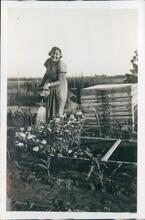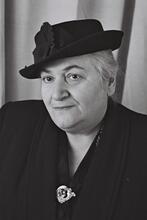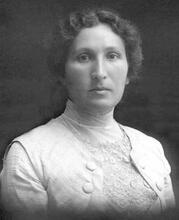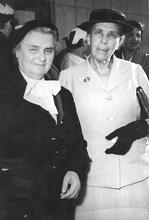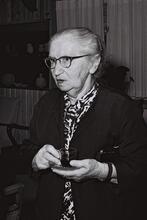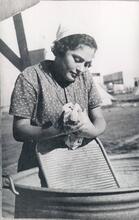Shoshana Arbeli-Almozlino
From her upbringing in a traditional Iraqi family to her work as Israeli Minister of Health, Shoshana Arbeli-Almozlino’s life spanned countries and careers. Born in Mosul in 1926, Arbeli-Almozlino joined the Iraqi Zionist underground in 1946 and a year later immigrated to Israel, forming a kibbutz with the other members. She worked in immigrant transit camps and in an employment agency before shifting back to politics. She became a Knesset member in 1966, where she would advocate for worker’s rights on the Labor and Welfare Committee. She worked to improve wages, reform benefits, and legalize prostitution and was responsible for amending much of Israel’s social policy law. In 1986, she was appointed Minister of Health and was the first minister to approve organ transplants.
Like the biographies of other figures prominent at the time of the establishment of the state of Israel, that of Shoshana Arbeli-Almozlino parallels the history of Zionism and the founding of the state, from her childhood in a traditional Iraqi family and membership in the Zionist underground in Iraq, through her immigration to Palestine and the founding of A voluntary collective community, mainly agricultural, in which there is no private wealth and which is responsible for all the needs of its members and their families.Kibbutz Neve Or, to her term as a member of the Lit. "assembly." The 120-member parliament of the State of Israel.Knesset and her services as Israel’s Minister of Health.
Early Life
Shoshana Arbeli Almozlino was born on January 26, 1926, in Mosul, Iraq. Her father, Shmuel Binyamin Arbili (?–1941), was a merchant and her mother, Safra (Shadra, née Hai, ?–1956), was a homemaker. Both came from the city of Erbil. Arbeli-Almozlino had five siblings—Rahel, Tovah, Daniel, Zabari, and Ilana, who, together with their mother, immigrated to Israel in May 1951 during Operation Ezra and Nehemiah (May 1950–August 1951).
In her autobiography, From the Iraqi Underground to the Israeli Government (1955), Arbeli-Almozlino attributes her closeness to the Zionist movement not to her family, which she describes as a typical traditional family, but to the influence of the Farhoud, a pogrom perpetrated against the Jews of Iraq in 1941 after the generals’ coup.
Arbeli-Almozlino joined the Zionist underground in Iraq during A seven-day festival to commemorate the Exodus from Egypt (eight days outside Israel) beginning on the 15th day of the Hebrew month of Nissan. Also called the "Festival of Mazzot"; the "Festival of Spring"; Pesah.Passover 1946 after two years of study at a teachers’ college in Baghdad. This led her to study Hebrew and change her name from Fahima to Shoshana. When one of the group’s members fled to Palestine, the Iraqi police arrested and interrogated Arbeli-Almozlino on suspicion of belonging to the Zionist underground.
Immigration and Life in Israel
On August 28, 1947, Arbeli-Almozlino immigrated to Palestine clandestinely as part of Operation Mikelberg (an airborne illegal immigration operation from Baghdad) and was settled together with the other members of the Iraqi group on Kibbutz Sde Nahum in the Beit Shean Valley. In 1949, after the War of Independence ended, she founded Kibbutz Neve Or in the Beit Shean Valley together with her comrades from the group. The period on Kibbutz Neve Or also marks the beginning of Arbeli-Almozlino’s political career and her joining the Ahdut Ha-Avodah party.
After the waves of immigration at the beginning of the 1950s, Arbeli-Almozlino, who was recruited to work in the immigrants’ transit camps, was stationed at Camp B in Beit Lid. In 1951 she officially left Kibbutz Neve Or after the kibbutz leadership refused to allow her mother, who had immigrated to Israel that year, to join her on the kibbutz.
In 1952 Arbeli-Almozlino left her position at the Jewish Agency’s Absorption Department at Beit Lid to become the coordinator of the women workers’ department at the Employment Service in Ramat Gan. In 1957 she became the founder of its Youth Department. When the Employment Services Law was enacted in 1959 and the employment bureaus became government agencies, Arbeli-Almozlino decided to leave the Employment Service, and continue her political career. Between 1959 and 1966 she served as a member of the executive board of the Mo’ezet ha-Po’alot and as the chairwoman of the department of training and employment on the Women Workers’ Councils. Arbeli-Almozlino was an active participant in the split in Mapam and became one of the members of the new party, Ahdut ha-Avodah–Po’alei Zion. At the same time she continued to work on the executive of the Mo’ezet ha-Po’alot (today Na’amat) until she joined the Sixth Knesset in 1966.
In 1965, at the age of thirty-nine, Arbeli-Almozlino married Natan Almozlino (b. 1913), a widower who was active in Ahdut Ha-Avodah and served as the treasurer of the Histadrut. Natan Almozlino and his first wife, Bellina, had two children, Uzi and Yishai. He and Arbeli-Almozlino had no children.
In the Knesset
Before the elections for the Sixth Knesset in 1965 the Ahdut ha-Avodah party merged with Mapai. Arbeli-Almozlino was placed forty-sixth on the list and entered the Knesset approximately two months after the beginning of its term when both Minister Hayyim Givati of Mapai and Minister Moshe Carmel of Ahdut ha-Avodah resigned. During all the years of her activity in the Knesset Arbeli-Almozlino recalled “feeling like a delegate from the Workers’ Movement” and even tried to give that sentiment practical expression through her membership of the legislature’s Labor and Welfare Committee throughout her term as a member of Knesset. Arbeli-Almozlino chaired the committee during the seventh and eighth Knessets and within its framework acted to broaden and deepen social legislation. She worked for improvement of wage-earners’ conditions, the broadening of benefits to those insured by the National Insurance Institute and reforms in child, senior and survivor benefits. She was responsible for amending many work laws. Examples include a thoroughgoing amendment of the National Insurance Institute law, the income protection law, an amendment to the law on working women—all laws which constituted a broad legal foundation for the State of Israel’s social policy.
Throughout her years in office Arbeli-Almozlino was considered an active and productive politician, connected to the party’s voters, especially those in the weaker sectors, residents of the poorer neighborhoods and people of Lit. "Eastern." Jew from Arab or Muslim country.Mizrahi extraction. She was also perceived as having sacrificed her private life for the sake of her parliamentary work. In contrast to her left-wing views on social issues, her political opinions were hawkish.
In addition to her work on the Labor Committee, Arbeli-Almozlino was also a member of the Economics Committee, the Education and Culture Committee, the State Control Committee and the Knesset Committee. After the Labor Coalition lost the 1977 elections, Arbeli-Almozlino served as Deputy Speaker of the Knesset and after the 1981 elections she was chosen to head the Interior Affairs Committee.
Although her attitude towards women’s issues was not that of a declared feminist, Arbeli-Almozlino worked for legislation to equalize the status of men and women and was aware of the social discrimination from which women suffered. She fought for the legalization of prostitution and the enforcement of medical supervision of prostitutes, and was among the group of Knesset members who brought about an amendment of the law on abortion.
In the national unity government established after early elections for the eleventh Knesset (1984), Arbeli-Almozlino was appointed Deputy Minister of Health. In October 1986, at the beginning of the rotation agreement, she became Minister of Health. In this position she stood out as the first minister to approve organ transplants (liver and heart) and paid fertility treatments.
Arbeli-Almozlino was not included in the cabinet after the 1988 elections, but returned to the Knesset as chair of the Economic Committee. In the primaries for the thirteenth Knesset in February 1992, after twenty-seven years of parliamentary activity (from the sixth Knesset until the twelfth [1965–1992]), Arbeli-Almozlino was not placed in a viable position on her party’s list of candidates and retired from political life.
Legacy
Arbeli-Almozlino continued her public activity even after retirement. She is the chairwoman of Inbar, an Israeli non-profit organization for sufferers from rheumatic disease; a member of the board of the Clalit Health Fund; and president of the Ezra Laniado Center for Mosul Jewish Heritage.
Shoshana Arbeli-Almozlino will be remembered as a strongly socialist member of Knesset who fought for the rights of the lower classes and for the equal status of women in Israeli law.
Arbeli-Almozlino passed away on June 12, 2015, at the age of 89.
Arbeli-Almozlino, Shoshana. From the Underground in Iraq to the Government of Israel (Hebrew). Tel Aviv: HaKibbutz Hame’uhad, 1998.
Kotler, Yair. Article in Ma’ariv, July 27, 1979.
Goldberg, Giora. “The Performance of Women in Legislative Policy: Israel’s Example.” Crossroads (1981).


